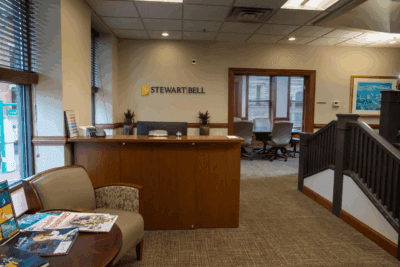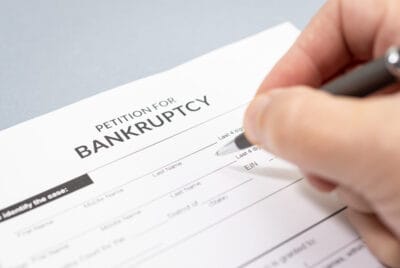
The Short Answer…
Lawyers negotiate settlements by first preparing a strong case. They gather evidence like medical records, bills, photos, and witness statements, and find past court decisions that support your claim. Your lawyer then sends a demand letter with a clear explanation of your losses and an opening number. After that, both sides trade offers and counteroffers to work toward a fair amount. If talks stall, they may use mediation, where a neutral third person helps both sides move towards an agreement.
Throughout the process, your lawyer uses strategy and clear communication to show why the payment should cover both economic damages (medical costs, lost wages, future care) and non-economic damages (pain, suffering, loss of enjoyment). They also push back against unfair insurance tactics. Most importantly, you make the final decision to accept or reject any offer. At Stewart Bell, PLLC, our West Virginia personal injury lawyers handle the negotiation so you can focus on healing while staying in control of the outcome.
Key Takeaways
- Strong evidence is key: Lawyers gather medical records, bills, and witness testimony to build leverage.
- The first demand is strategic: Attorneys often start with a higher number to leave room for negotiation.
- Insurance adjusters use tactics: Lawyers anticipate lowball offers and counter with facts and precedents.
- Settlement isn’t the end until you agree: The client always decides whether to accept or reject an offer.
- Legal representation helps maximize results: Injury victims tend to recover more with an attorney than without one.
Table of Contents
What Is Settlement Negotiation in a Personal Injury Case?
Settlement negotiation is the process of resolving a personal injury case without going to trial. Instead of leaving the decision to a judge or jury, both sides agree on a compensation amount that covers damages such as medical bills, lost income, and pain and suffering.
This is often faster, less stressful, and more cost-effective than litigation. However, negotiations can be complex because insurance companies are motivated to minimize payouts.
Who Is Involved in Settlement Negotiations?
Settlement negotiations bring together several key parties, each with an important role in determining the outcome of your case.
- You, the client: You have the final say on accepting or rejecting any offer.
- Your attorney: Represents your interests, prepares evidence, and leads the negotiation strategy.
- Insurance company representatives: Usually adjusters or defense attorneys tasked with protecting the insurer’s bottom line.
- Mediators or arbitrators (sometimes): Neutral third parties who help facilitate agreement if direct talks stall.
Each of these participants influences how and how quickly a settlement is reached. With Stewart Bell, PLLC guiding the process, you can feel confident that your rights are protected and your best interests are always the priority.
Steps in the Settlement Negotiation Process
The process of negotiating a settlement follows a series of structured steps. Each phase is designed to build leverage, protect your rights, and move the case closer to a fair resolution.
1. Initial Case Evaluation
Your lawyer begins by thoroughly reviewing medical records, accident reports, witness statements, and financial documentation such as pay stubs or tax returns. They also assess liability under West Virginia law and consider how similar cases have been resolved in the past. This evaluation helps determine the true value of your claim and sets the foundation for negotiations.
2. Drafting the Demand Letter
Next, your attorney prepares a demand letter addressed to the insurance company. This letter lays out the facts of the case, outlines the damages you’ve suffered, and proposes an initial settlement amount. The figure requested is often intentionally higher than the expected outcome, leaving room for back-and-forth negotiation.
3. Counteroffers and Response Strategies
Once the insurance company responds (usually with a much lower offer), your lawyer carefully analyzes the proposal and crafts a counteroffer. They rely on medical evidence, expert testimony, and the risk the insurer faces if the case goes to trial. This stage often involves several rounds of offers and counteroffers.
4. Mediation and Arbitration
If direct negotiations stall, your attorney may suggest alternative dispute resolution. Mediation brings in a neutral third party to help both sides find common ground. Arbitration, on the other hand, can result in a binding decision, depending on the terms agreed upon beforehand. Both options can save time and expense compared to litigation.
5. Final Agreement
When both parties reach an acceptable figure, attorneys draft a formal settlement agreement. Your lawyer will carefully review the terms with you to ensure nothing has been overlooked. Importantly, no settlement is final until you sign the agreement, giving you complete control over the outcome.
Common Insurance Company Challenges
One of the biggest obstacles in personal injury cases is dealing with insurance companies. While their adjusters may sound cooperative, their ultimate goal is to protect profits, not to ensure you receive fair compensation. This can make the negotiation process frustrating and overwhelming if you don’t have legal representation.
Insurance companies may:
- Offer settlements far below the true value of your case: Lowball offers are common, especially early in negotiations when insurers hope you’ll accept quick cash without realizing the long-term costs of your injuries.
- Delay negotiations to create pressure: By stalling, insurers hope medical bills and lost wages push victims into accepting less than they may deserve.
- Dispute liability or downplay injuries: Adjusters may try to shift blame onto you or argue that your injuries are not as severe.
- Rely on policy limits: Sometimes insurers insist that compensation cannot exceed the coverage amount, even if your damages are much greater.
- Use confusing language: Settlement offers may include fine print that limits your rights or excludes future expenses like ongoing treatment.
An experienced attorney recognizes these tactics immediately and knows how to counter them with solid evidence, legal arguments, and negotiation strategies. With Stewart Bell, PLLC advocating for you, insurance companies are far less likely to succeed in undervaluing your claim.
Negotiation Strategies Lawyers Use to Maximize Settlements
Successful settlement negotiations are the result of careful planning and smart legal tactics. Personal injury attorneys rely on proven strategies to increase leverage, push back against lowball offers, and secure the highest possible compensation for their clients.
- Building a strong case with strong evidence: Attorneys collect every piece of supporting documentation, including medical records, accident reports, pay stubs, and expert opinions. The stronger the evidence, the harder it is for insurers to argue against fair compensation.
- Leveraging legal precedents: Lawyers research similar cases and past court decisions to show how juries have valued comparable injuries. This creates a benchmark that insurance companies must take seriously when evaluating your claim.
- Timing negotiations strategically: A skilled lawyer understands when to make demands. Often, they wait until you’ve reached maximum medical improvement (MMI) so the full scope of your injuries, treatment costs, and future care needs are clear. This prevents settling for less than you may ultimately need.
- Using trial readiness as leverage: Insurance companies fear the uncertainty of a jury trial. When attorneys prepare every case as if it may go to court, it signals that they are ready to fight, often prompting insurers to raise their offers to avoid litigation.
- Maintaining professional but firm communication: Negotiations are most effective when attorneys strike a balance between professionalism and assertiveness. They remain respectful but persistent, ensuring your claim is taken seriously while keeping discussions moving forward.
Together, these strategies create a powerful advantage for injured clients, helping maximize your potential settlement value and ensuring that insurance companies treat claims with the seriousness they deserve.
FAQs About Settlement Negotiations
What is a settlement offer?
A settlement offer is a proposed amount of money to resolve your claim without going to trial. It’s based on the insurer’s evaluation of liability, your damages, and risk at trial. Your lawyer reviews the offer, compares it to your case value, and advises you on whether to accept, counter, or proceed toward litigation.
What does it mean to settle out of court?
Settling out of court means both sides agree on compensation without asking a judge or jury to decide. You avoid the delays, expense, and uncertainty of trial, but you still receive a binding agreement that closes your claim once you sign a release.
When do settlement negotiations occur?
Negotiations can begin as soon as your attorney has enough evidence to support your claim, often after you reach maximum medical improvement. They may continue through claim filing, after a lawsuit is filed, during mediation, and even up to (or during) trial if needed.
How long does it take to negotiate a settlement agreement?
Simple claims can resolve in a few weeks or months, while complex cases with serious injuries, disputed liability, or multiple insurers can take longer. Timing often hinges on reaching maximum medical improvement, getting expert opinions, and clearing liens so you don’t settle before you know your full costs.
What is a reasonable settlement offer?
A reasonable offer covers your full economic losses (medical bills, future care, lost income) and fairly compensates non-economic harms (pain, suffering, loss of enjoyment). Your lawyer also considers policy limits and the likelihood of a better result at trial.
What happens if I don’t sign a settlement agreement?
Nothing becomes final. Your case stays open, negotiations can continue, and your lawyer may push forward with litigation or mediation to improve the settlement amount. You keep full control—no settlement is binding until you sign.
What influences a personal injury settlement?
Settlements are influenced by proof of fault, the quality of your evidence, and the documented impact of your injuries now and in the future. Insurance policy limits, healthcare liens/subrogation, venue (local jury tendencies), and whether you have legal representation also affect the amount you may receive.
What factors are considered in negotiating settlements?
Attorneys look at several core factors when negotiating a settlement:
- Liability: Who caused the accident and how clearly can we prove it? The stronger the evidence, the higher the settlement leverage. If your own fault is alleged, your recovery may be reduced under comparative negligence rules.
- Total Damages: This captures the full picture of your medical expenses (past and future), lost wages and reduced earning capacity, and non-economic losses like pain, suffering, and loss of enjoyment. Well-documented future needs can significantly raise the potential value.
- Medical Bills: Negotiations account for billed charges, what was actually paid, and what remains owed.
- Policy Limits: An insurer usually cannot pay beyond its policy limits unless rare exceptions apply. Knowing the at-fault party’s coverage sets an upper boundary and informs strategy.
- Location: Venue matters. Local jury tendencies, judge practices, and past verdict amounts influence what insurers consider “fair.” Cases in venues known for higher verdicts often lead to higher settlement offers.
Let Our Trusted Lawyers Negotiate Your Injury Settlement
If you’re still wondering how lawyers negotiate settlements, the short answer is strategy, evidence, and leverage—exactly what our team at Stewart Bell, PLLC brings to every case. We build your claim the right way, counter insurer tactics, and push for the maximum compensation available.
Why work with Stewart Bell, PLLC?
- Evidence-first strategy: We document every dollar of harm—past, present, and future—to justify full compensation.
- Skilled negotiation: We anticipate adjuster tactics and we know how to successfully fight back.
- Trial-readiness: We prepare like we’re going to trial to increase your bargaining power at the table.
- Local advantage: We have decades of experience in West Virginia with local courts, juries, and insurers. We proudly serve clients in Charleston, Huntington, Dunbar, and throughout the state.
- Clear communication: You make the final call with our support at every step.
- No fee unless we win: You focus on healing while we handle the fight with no upfront costs.
Don’t leave money on the table. Schedule your free consultation and let our team start negotiating your best possible settlement today.





